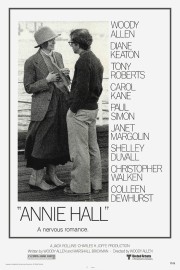Annie Hall
Woody Allen doesn’t have a place in my film collection. That isn’t a reflection on his personal issues, but the fact that I do not, in fact, own any Allen films. Realizing that is a bit surprising, considering Allen’s standing as one of the legendary figures in film comedy, but the truth is, I’ve been coming to Allen’s work late, starting with his sometimes-frustrating ’90s work and only now getting to the work that he built his reputation in the past few years. That said, I did watch his 1977 Best Picture winner, “Annie Hall,” back when I first started watching movies intensely, and I’m watching it again now. Time to add my thoughts to Sonic Cinema, and the complicated conversation about its place in Allen’s career.
First of all, allow me some time in discussing it compared to “Star Wars,” the film I’ve grown up loving in my life, which this film won Best Picture over. Truth be told, I understand why it won. This is one of Allen’s most engaging, and intelligently-written films, with performances by he and the luminous Diane Keaton, who won one of the film’s four Oscars, that throw us right in the middle of their complicated courtship through moments both good, and bad. This isn’t just a high-water mark for Allen individually, as a filmmaker, but for film romance, in general.
Allen stars as Alvy Singer, a comedian and writer who has just turned 40, and we begin to see his relationship with Annie Hall, played by Keaton. The film takes a nonlinear look at their relationship, instead showing us moments both good and bad, along with Alvy’s history of dating which includes a liberal Democrat (the great Carol Kane, who marries Alvy, but they divorce after Alvy spins a Kennedy assassination theory as they’re in bed) and a Rolling Stone writer (Shelley Duvall) whose religious beliefs aren’t something that Alvy feels comfortable about (as he says, “I can’t get with any religion that advertises in Popular Mechanics.”). He makes him way back to Annie, and you can see that while they have great chemistry, why Annie would have a hard time dealing with Alvy’s anxiety and neurosis all the time. He feels scared to commit to a live-in relationship, and seems more engaged with talking about his issues than being interested in hers. He has a friend in Rob (Tony Roberts) he can talk to, but he ultimately has to get past his own issues himself if he’s going to make things work.
There’s some truly inspired writing and staging of scenes on Allen’s part in this film- it’s no wonder he won the screenplay and directing Oscars for “Annie Hall.” The subtitle scene between Alvy and Annie, as the subtitles clue us in to what each is thinking with each thing they say to one another, is a masterpiece of comedic filmmaking. There’s a scene where they are in line to see a movie, and Alvy- while self-centeredly discussing himself with Annie- is agitated by the pompous musings of the guy behind them so much that he brings in Marshall McLuhan to end his ramblings. The way we see Alvy and Annie discussing their families as they watch on as their present selves has an existential pull that brings, to the center of Allen’s work, the inspirations of Bergman and Fellini he hints at in moments throughout this film. And the scene of Alvy and Annie making love, while Annie’s spirit leaves her body, and Alvy notices the lack of passion she has intently. These are all probably the most famous scenes in the film, to be sure, but they retain their value because of how much they say about the characters, and about romantic relationships, in general. In light of the discussion surround Allen’s personal life for the past 25 years, some moments- especially one where his 40-year-old self tries to justify kissing a grade school classmate when they were six- feels particularly awkward, but there’s a truth and honestly that goes with many of the funniest moments in the film that still resonates strongly through “Annie Hall.”
I started this review by stating that Woody Allen has no place in my film collection. Allen’s transgressions, whether all of them happened or not, are unacceptable for me as a human being, and I’ve never really put Allen up on a pedestal as a writer-director (probably because I’ve come at most of his better films after the fact), but as a writer on film, Allen has a particular place in the study of film that can not be ignored, and his work- for better or worse- has a particular voice that has hit on some of the truest of truths when it comes to life, and love, any filmmaker has hit upon when it comes to their films, even when he veers into self-indulgence. I do not love Woody Allen as an individual, but when it comes to a film like “Annie Hall” or “The Purple Rose of Cairo” or “Midnight in Paris,” I can definitely love him as a filmmaker, and those memories are something I will always be grateful for.










